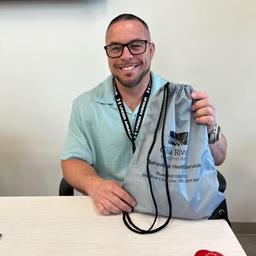Therapists in Arizona
Find the best therapist in Arizona for your needs on Grow Therapy. With 213 verified therapists in Arizona, you can connect with licensed professionals who are currently accepting new patients. Grow Therapy verifies and credentials each Arizona therapist to ensure they are active, available, and aligned with your needs. Whether you’re seeking support for parenting support, chronic illness, substance use, Arizona’s therapists offer compassionate, personalized care tailored to your unique circumstances.
Availability updated: 7/19/2025
Mike Petagna

Kimberly Dickens
(she/her)

Find therapists experienced in these areas
Hannah Beer

Rob Koehl

Frequently rebooked
Dr. Robert Lusson
(he/him)

Russell Johnson
(he/him)

Shelly Zorn
(she/her)

Daniel Stokes

Paul Otto
(he/him)

Frequently rebooked
Tinsley L

Kiley Baglama
(she/her)

Carolyn Prince

Stan Savoia

Jennifer J. Ramos
(she/her)

Chel'sea Ryan - Watford
(she/her)

Frequently rebooked
Roy Chukwuemeka
(he/him)

Vicky Snyder

Peter Vernezze

Frequently rebooked
Elizabeth Lachapelle

Frequently rebooked
JoAnn Storms

Laura Carrillo
(she/her)

Tabitha Baldwin
(she/her)

Frequently rebooked
Brandon Chatfield

Julie Bush
(she/her)

Frequently rebooked
Dr Ezeh
(he/him)

Dan Kimball
(he/him)

Dr. Isaiah Gonzalez
(he/him)

Lydia Davis

Justine Pak
(she/her)

Briana Lujan

Austin Obika

Ndolia Schild

Courtney Dombrowski

Maria Grimshaw-Clark
(she/her)

Cary Gauna

Leo Merino
(he/him)

Frequently rebooked
Dawn Abbott

Stephen Roser
(he/him)

Micquaia Mcneal

Josh Ulrich
(he/him)

Frequently rebooked
Samantha Contreras
(she/her)

Elizabeth Hightower Stanley

Bonnie Grossman

Patricia Curran

Danielle Williams

Iryna von Esch

Elizabeth Gluff

Charity Thomas
(she/they)

Jeremy Pumphrey

Nate Hempel

Learn more about our therapists in Arizona
Average years in practice:
13
Top conditions treated:
- 81% Anxiety
- 73% Depression
- 53% Trauma and PTSD
- 41% Coping Skills
Top 3 insurances accepted:
- Cigna
- Oscar
- United Medical Resources
Providers see clients:
- 91% online only
- 9% in-person and online
Providers are:
- 78% Female
- 19% Male
- 1% Other
Search therapists by insurance
- Blue Cross Blue Shield
- Aetna
- Cigna
- Anthem
- United Medical Resources
- Optum
- UnitedHealthcare Shared Services
- Oscar
- AvMed
- UnitedHealthcare Life Insurance
- EAP:Cigna
- UnitedHealthcare StudentResources
- Surest (formerly Bind)
- Humana - Medicare
- All Savers
- Oxford
- Humana Dual (Medicare & Medicaid)
- Golden Rule
- OptumHealth Complex Medical Conditions
- Evernorth
- EAP:Evernorth
- UnitedHealthcare/Optum
- Harvard Pilgrim/UnitedHealthcare
- EAP:UnitedHealthcare/Optum
- Tufts Health/Cigna
- Aetna - Medicare
Search therapists by their specialty
- Addiction Therapists in Arizona
- ADHD Therapists in Arizona
- Anger Management Therapists in Arizona
- Anxiety Therapists in Arizona
- Bipolar Disorder Therapists in Arizona
- Child Therapists in Arizona
- Couples Counseling Therapists in Arizona
- Depression Therapists in Arizona
- Grief Therapists in Arizona
- Veterans Therapists in Arizona
- OCD Therapists in Arizona
- Post Partum Therapists in Arizona
- Self Esteem Therapists in Arizona
- Spirituality Therapists in Arizona
- Trauma & PTSD Therapists in Arizona
Search therapists by their identity
Search therapists by type of therapy
- Attachment Based Therapists in Arizona
- Christian Counselors in Arizona
- Cognitive Behavioral Therapists in Arizona
- Cognitive Processing Therapists in Arizona
- Dialectical Behavior Therapists in Arizona
- EMDR Therapists in Arizona
- Grief Therapists in Arizona
- Internal Family Systems Therapists in Arizona
Search therapists in nearby states
Frequently asked questions
Why filter by Arizona rather than a city
like Phoenix?
When looking for online therapy, you can see anyone that is credentialed in the state. We want you to find the best fit, therefore, Grow Therapy shows available therapists across Arizona from Tucson to Mesa! If you’d rather see someone in-person, you can change the filter from virtual and find a therapist near you in Arizona.
Will my therapist take insurance?
When booking you’ll be asked to verify with your Member ID. However, if you don’t have any of the insurances available you can select cash. Our therapists will have their cost of appointment on their profile. Individual session costs will vary.
How does the Specialty Filter work? Can I find a therapist that focuses on a specific issue?
The specialty filter is optional. You don’t need to check any boxes to see a provider. However, fit is very important when selecting an online therapist. If you have knowledge or experience to recognize what specialties you may need.
What are the "Clients say I'm" badges?
Grow Therapy asks patients about their experience with therapists after they have had a certain number of sessions. After enough responses, we add those characteristics to their profiles to help you find the best online therapists for you. We're still working on collecting this information from all our therapists.
Why use Gender, Age, and Identities filters?
Finding a provider with a similar life experience can be beneficial because it can be easier to establish rapport and potentially be understood quicker and clearer.
What to expect during your first session?
Depending upon your provider's specialty, you may also discuss the methods the therapist will use. For additional information on therapy methods, please visit the Grow Therapy Help Center. Some people feel nervous before their first appointment, and that is totally normal! Coming prepared with a list of questions for your therapist may help. Remember, you're taking a brave step by seeking therapy, and it is okay to be nervous as you try something new.